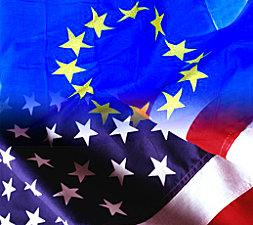The Great Corporate Swindle: Creation of the World’s Largest Free Trade Area. Agribusiness Sets the US-EU TTIP Agenda
The Transatlantic Trade and Investment Partnership (TTIP)

According to the official language, the Transatlantic Trade and Investment Partnership (TTIP) between the US and
EU plans to create the world’s largest free trade area, ‘protect
investment’ and remove ‘unnecessary regulatory barriers’. Cut through
the rhetoric and it becomes clear that the treaty aims to weaken labour,
social, environmental and consumer protection standards.
Masterminded by the ‘High Level Working Group on Jobs and Growth’,
this group has been accused of constituting nothing but a bunch of
unelected and unaccountable, notorious pro-free-trade bureaucrats from
both sides of the Atlantic [1].IP
In addition to the biotech sector, groups lobbying for the deal have included Toyota, General Motors, the pharmaceutical industry, IBM and
the Chamber of Commerce of the US, one of the most powerful corporate
lobby groups in the US. Business Europe, the main organisation
representing employers in Europe, launched its own strategy on an EU-US
economic and trade partnership in early 2012. Its suggestions were
widely included in the draft EU mandate [2].
The deal could empower
corporations to legally challenge a wide range of regulations which they
dislike [3] and drive decision making ‘underground’, thereby escaping
democratic scrutiny and allowing corporations to ‘capture’ regulatory
processes [4].
One of the key aspects of the
negotiations is that both the EU and US should recognise their
respective rules and regulations, which could reduce regulation to the
lowest common denominator. The official language talks of “mutual
recognition” of standards or so-called reduction of non-tariff barriers.
For the EU, that could mean accepting US standards in many areas,
including food and agriculture, which are lower than those of the EU.
Food lobby group Food and Drink
Europe has demanded the facilitation of the low level presence of
unapproved genetically modified crops. This is also supported by feed
and grain trading giants, including Cargill, Bunge, ADM, and the big
farmers’ lobby COPA-COGECA.
The negotiations for this deal
are shrouded in secrecy and are closed to proper public scrutiny, with
trade unionists and public interests groups having been effectively
sidelined in favour of a corporate-driven agenda [5]. This is however
symptomatic of the general ethos and practices of Brussels’ bureaucrats
and officials [6]. The talks amount to little more than backroom deals,
while striving to give the appearance of somehow being democratic. If it
goes through, this treaty would effectively constitute a vital part of
cementing the ongoing restructuring of economies in favour of elite
interests [7,8].
There has been a deliberate
ploy to bar the public from any kind of meaningful information about or
input into the world’s biggest trade deal ever to be negotiated. The
trade deal appears to be a unique opportunity to achieve through closed
and non-transparent negotiations what hasn’t been possible so far in a
transparent and democratic way.
No sector has lobbied the European Commission more during the
preparation phase for the negotiations on the proposed deal than the
agribusiness sector, according to data just published by CEO in a series
of research-based infographics [9]. Food multinationals, agri-traders
and seed producers have had more contacts with the Commission’s trade
department (DG Trade) than lobbyists from the pharmaceutical, chemical,
financial and car industry put together.
Of the 560 lobby encounters
that DG Trade held to prepare the negotiations, 520 (92 percent) were
with business lobbyists, while only 26 (four percent) were with public
interest groups. For every encounter with a trade union or consumer
group, there were 20 with companies and industry federations.
The data covers contributions to the Commission’s public consultations,
public stakeholder meetings and lobby meetings behind closed doors.
Pia Eberhardt, trade campaigner with Corporate Europe Observatory, says:“DG Trade actively involved business lobbyists in drawing up the EU position for TTIP while keeping ‘pesky’ trade unionists and other public interest groups at bay. The result is a big-business-first agenda for the negotiations which endangers many achievements that people in Europe have long struggled for, from food safety rules to environmental protection.”
While the European Commission
has claimed publicly that the trade deal will not threaten European
rules on food and environmental safety, the TTIP could lead to precisely
that. Nina Holland, agribusiness campaigner with CEO, argues:
“Agribusiness lobbies such as the pesticide industry have strongly pushed their agenda via the TTIP negotiations with the aim of undermining current EU food regulations. Trade tools such as “mutual recognition” and “regulatory co-operation” are likely to lead to an erosion of food safety standards in the long run. The industry is also trying to use TTIP to derail important EU initiatives such as the one to deal with [check] endocrine disrupting chemicals.”The infographics also shine a light on other economic sectors that were lobbying actively in the preparatory phase of the TTIP negotiations, including telecommunications and IT, auto industry, engineering and the chemical sector.
The data suggest that the agenda-setting for TTIP has been largely driven by businesses with headquarters in the US, Germany and the UK and by industry lobby groups organised on the EU level such as the European employers’ federation BusinessEurope and the European Services Forum, a lobby outfit of large services companies such as Deutsche Bank and TheCity UK. Companies from Greece and large parts of Eastern Europe were entirely absent from the corporate lobby push for TTIP, suggesting that businesses in the poorer EU countries have little to gain from this trade deal.
The data also reveals that more than 30 per cent (94 out of 269) of the private sector interest groups that have lobbied DG Trade on TTIP are absent from the EU’s Transparency Register, among them large companies such as Walmart, Walt Disney, General Motors, France Telecom and Maersk. Some of the industry associations lobbying hardest for TTIP such as the US Chamber of Commerce and the Transatlantic Business Council are also lobbying under the radar of the lobby register.
Notes



No comments:
Post a Comment